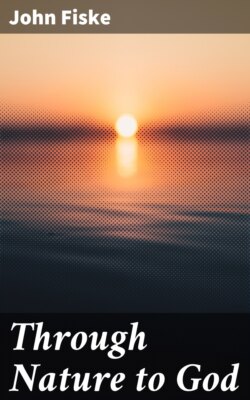Читать книгу Through Nature to God - Fiske John - Страница 8
II
The Pilgrim's Burden
ОглавлениеBut before I can properly elucidate this view, and make clear what is meant by connecting the loss of innocence with the beginning of the Rise of Man, it is necessary to bestow a few words upon a well-worn theme, and recall to mind the helpless and hopeless bewilderment into which all theologies and all philosophies have been thrown by the problem of the existence of evil. From the ancient Greek and Hebrew thinkers who were saddened by the spectacle of wickedness insolent and unpunished, down to the aged Voltaire and the youthful Goethe who felt their theories of God's justice quite baffled by the Lisbon earthquake, or down to the atheistic pessimist of our own time who asserts that the Power which sustains the world is but a blind and terrible force without concern for man's welfare of body or of soul,—from first to last the history of philosophy teems with the mournful instances of this discouragement. In that tale of War and Peace wherein the fervid genius of Tolstoi has depicted scenes and characters of modern life with truthful grandeur like that of the ancient epic poems, when our friend, the genial and thoughtful hero of the story, stands in the public square at Moscow, uncertain of his fate, while the kindly bright-faced peasant and the eager pale young mechanic are shot dead by his side, and all for a silly suspicion on the part of Napoleon's soldiery; as he stands and sees the bodies, still warm and quivering, tossed into a trench and loose earth hastily shovelled over them, his manly heart surges in rebellion against a world in which such things can be, and a voice within him cries out,—not in the mood in which the fool crieth, but with the anguish of a tender soul wrung by the sight of stupendous iniquity,—"There is no God!" It is but the utterance of an old-world feeling, natural enough to hard-pressed and sorely tried humanity in those moments that have come to it only too often, when triumphant wrong is dreadfully real and close at hand, while anything like compensation seems shadowy and doubtful and far away.
It is this feeling that has created the belief in a devil, an adversary to the good God, an adversary hard to conquer or baffle. The feeling underlies every theological creed, and in every system of philosophy we find it lurking somewhere. In these dark regions of thought, which science has such scanty means for exploring, the statements which make up a creed are apt to be the outgrowth of such an all-pervading sentiment, while their form will be found to vary with the knowledge of nature—meagre enough at all times, and even in our boasted time—which happens to characterize the age in which they are made. Hence, well-nigh universally has philosophy proceeded upon the assumption, whether tacit or avowed, that pain and wrong are things hard to be reconciled with the theory that the world is created and ruled by a Being at once all-powerful and all-benevolent. Why does such a Being permit the misery that we behold encompassing us on every side? When we would fain believe that God is love indeed, and love creation's final law, how comes it that nature, red in tooth and claw with ravine, shrieks against our creed? If this question could be fairly answered, does it not seem as if the burden of life, which so often seems intolerable, would forthwith slip from our shoulders, and leave us, like Bunyan's pilgrim, free and bold and light-hearted to contend against all the ills of the world?
Ever since human intelligence became enlightened enough to grope for a meaning and purpose in human life, this problem of the existence of evil has been the burden of man. In the effort to throw it off, leaders of thought have had recourse to almost every imaginable device. It has usually been found necessary to represent the Creator as finite either in power or in goodness, although the limitation is seldom avowed, except by writers who have a leaning toward atheism and take a grim pleasure in pointing out flaws in the constitution of things. Among modern writers the most conspicuous instance of this temper is afforded by that much too positive philosopher Auguste Comte, who would fain have tipped the earth's axis at a different angle and altered the arrangements of nature in many fanciful ways. He was like Alphonso, the learned king of Castile, who regretted that he had not been present when the world was created,—he could have given such excellent advice!
In a very different mood the great Leibnitz, in his famous theory of optimism, argued that a perfect world is in the nature of things impossible, but that the world in which we live is the best of possible worlds. The limitation of the Creator's power is made somewhat more explicitly by Plato, who regarded the world as the imperfect realization of a Divine Idea that in itself is perfect. It is owing to the intractableness and vileness of matter that the Divine Idea finds itself so imperfectly realized. Thus the Creator's power is limited by the nature of the material out of which he makes the world. In other words, the world in which we live is the best the Creator could make out of the wretched material at his disposal. This Platonic view is closely akin to that of Leibnitz, but is expressed in such wise as to lend itself more readily to myth-making. Matter is not only considered as what Dr. Martineau would call a "datum objective to God," but it is endowed with a diabolical character of its own.
